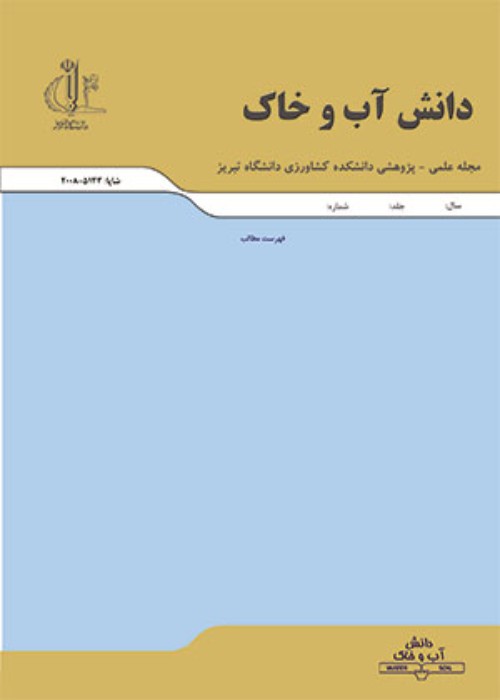Effects of Organic and Nitrogen Fertilizers on Water Use Efficiency, Yield and the Growth Characteristics of Wheat (Triticum aestivum cv. Alvand)
The effects of organic and nitrogen fertilizers on water use efficiency, yield and growth characteristics of wheat (Triticum aestivum cv. Alvand) with the aim of optimum using of chemical and organic fertilizers for achieving sustainable agriculture, were studied in a randomized complete blocks design with 15 treatments and three replicates at field conditions in Agricultural Research Station of University of Tabriz. The treatments included: control (without manure and nitrogen application), 150 kg urea/ha, 300 kg urea/ha, 30 ton sewage sludge/ha, 60 ton sewage sludge/ha, 30 ton municipal compost/ha, 60 ton municipal compost/ha, 30 ton manure/ha, 60 ton manure/ha, 30 ton sewage sludge + 150 kg urea/ha, 60 ton sewage sludge + 150 kg urea/ha, 30 ton municipal compost + 150 kg urea/ha, 60 ton municipal compost + 150 kg urea/ha, 30 ton manure + 150 kg urea/ha and 60 ton manure + 150 kg urea/ha. The chlorophyll index was determined in the middle of growth period. The grain yield, biological yield, plant height, stem diameter, number of spikes per square meter, grain number per spike, 1000-grain weight, spike length, leaf number per plant were measured at the end of plant growth period. The results showed that application of 150 and 300 kg urea/ha increased the grain yield, biological yield, plant height, stem diameter, leaf number per plant, chlorophyll index and water use efficiency while it had no significant effect on grain number per spike, number of spikelet per spike, 1000-grain weight, and harvest index. Application of animal manure, municipal compost and sewage sludge increased the most of agronomic characteristics of wheat except spikes number per square meter and number of spikelet per spike. By increasing the level of organic fertilizer from 30 to 60 t/ha, the stem diameter and chlorophyll index increased significantly but other studied characteristics did not change significantly. Integrated use of organic fertilizers (manure or municipal compost or sewage sludge) with nitrogen fertilizer (urea) increased grain yield, biological yield, chlorophyll index and water use efficiency of wheat compared to the control and the use of nitrogen and organic fertilizers alone. The highest grain yield and biological yield were observed in 60 ton manure + 150 kg urea/ha treatment. In general, in order to decrease nitrogen fertilizers, to increase wheat yield and quality, application of 150 kg urea and 60 ton manure or municipal compost or sewage sludge per hectare can be recommended at similar conditions.
Compost , Manure , Nitrogen , Sewage sludge , Wheat
- حق عضویت دریافتی صرف حمایت از نشریات عضو و نگهداری، تکمیل و توسعه مگیران میشود.
- پرداخت حق اشتراک و دانلود مقالات اجازه بازنشر آن در سایر رسانههای چاپی و دیجیتال را به کاربر نمیدهد.



